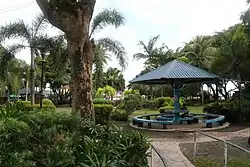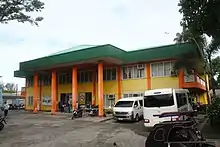Bongabong
Bongabong, officially the Municipality of Bongabong (Tagalog: Bayan ng Bongabong), is a 1st class municipality in the province of Oriental Mindoro, Philippines. According to the 2020 census, it has a population of 76,973 people.[3]
Bongabong | |
|---|---|
| Municipality of Bongabong | |
 Park and plaza | |
 Flag  Seal | |
 Map of Oriental Mindoro with Bongabong highlighted | |
OpenStreetMap | |
.svg.png.webp) Bongabong Location within the Philippines | |
| Coordinates: 12°44′49″N 121°29′17″E | |
| Country | Philippines |
| Region | Mimaropa |
| Province | Oriental Mindoro |
| District | 2nd district |
| Founded | 1927 |
| Barangays | 36 (see Barangays) |
| Government | |
| • Type | Sangguniang Bayan |
| • Mayor | Elegio 'Elgin' A. Malaluan |
| • Vice Mayor | Richard S. Candelario |
| • Representative | Alfonso V. Umali Jr. |
| • Electorate | 46,894 voters (2022) |
| Area | |
| • Total | 498.20 km2 (192.36 sq mi) |
| Elevation | 16 m (52 ft) |
| Highest elevation | 136 m (446 ft) |
| Lowest elevation | 0 m (0 ft) |
| Population (2020 census)[3] | |
| • Total | 76,973 |
| • Density | 150/km2 (400/sq mi) |
| • Households | 18,568 |
| Economy | |
| • Income class | 1st municipal income class |
| • Poverty incidence | 16.50 |
| • Revenue | ₱ 307.2 million (2020) |
| • Assets | ₱ 973.7 million (2020) |
| • Expenditure | ₱ 226.7 million (2020) |
| • Liabilities | ₱ 272.2 million (2020) |
| Service provider | |
| • Electricity | Oriental Mindoro Electric Cooperative (ORMECO) |
| Time zone | UTC+8 (PST) |
| ZIP code | 5211 |
| PSGC | |
| IDD : area code | +63 (0)43 |
| Native languages | Romblomanon Tagalog |
| Website | bongabong |
The town is home to Kuta Bongabong (Fuerza de Bongabong), one of the oldest Spanish colonial fortifications in the Philippines. The fort is in dire need of proper conservation. The only agency with the proper capabilities to restore the fort is the National Museum of the Philippines.[5]
Geography
Bongabong is 104 kilometres (65 mi) from Calapan, the provincial capital.
Barangays
Bongabong is politically subdivided into 36 barangays. Each barangay consists of puroks and some have sitios.
- Anilao
- Aplaya
- Bagumbayan I
- Bagumbayan II
- Batangan
- Camantigue
- Bukal
- Carmundo
- Cawayan
- Dayhagan
- Formon
- Hagan
- Hagupit
- Ipil
- Kaligtasan
- Labasan
- Labonan
- Libertad
- Lisap
- Luna
- Malitbog
- Mapang
- Masaguisi
- Mina de Oro
- Morente
- Ogbot
- Orconuma
- Poblacion
- Pulosahi
- Sagana
- San Isidro
- San Jose
- San Juan
- Santa Cruz
- Sigange
- Tawas
Climate
| Climate data for Bongabong, Oriental Mindoro | |||||||||||||
|---|---|---|---|---|---|---|---|---|---|---|---|---|---|
| Month | Jan | Feb | Mar | Apr | May | Jun | Jul | Aug | Sep | Oct | Nov | Dec | Year |
| Average high °C (°F) | 28 (82) |
29 (84) |
30 (86) |
31 (88) |
31 (88) |
30 (86) |
29 (84) |
29 (84) |
29 (84) |
29 (84) |
28 (82) |
27 (81) |
29 (84) |
| Average low °C (°F) | 21 (70) |
21 (70) |
22 (72) |
23 (73) |
25 (77) |
25 (77) |
25 (77) |
25 (77) |
25 (77) |
24 (75) |
23 (73) |
23 (73) |
24 (74) |
| Average precipitation mm (inches) | 31 (1.2) |
20 (0.8) |
25 (1.0) |
39 (1.5) |
152 (6.0) |
269 (10.6) |
314 (12.4) |
285 (11.2) |
303 (11.9) |
208 (8.2) |
95 (3.7) |
70 (2.8) |
1,811 (71.3) |
| Average rainy days | 9.5 | 7.1 | 9.0 | 11.3 | 21.0 | 25.7 | 28.1 | 26.5 | 27.3 | 24.6 | 16.5 | 12.1 | 218.7 |
| Source: Meteoblue[6] | |||||||||||||
Demographics
| Year | Pop. | ±% p.a. |
|---|---|---|
| 1939 | 8,054 | — |
| 1948 | 17,800 | +9.21% |
| 1960 | 22,018 | +1.79% |
| 1970 | 32,167 | +3.86% |
| 1975 | 38,358 | +3.59% |
| 1980 | 41,719 | +1.69% |
| 1990 | 50,213 | +1.87% |
| 1995 | 57,403 | +2.54% |
| 2000 | 59,477 | +0.76% |
| 2007 | 61,127 | +0.38% |
| 2010 | 66,569 | +3.15% |
| 2015 | 72,073 | +1.52% |
| 2020 | 76,973 | +1.30% |
| Source: Philippine Statistics Authority[7][8][9][10] | ||
Economy
Government

Elected officials
(2022-2025):
- Mayor: Elegio Malaluan
- Vice Mayor: Richard Candelario
- Councilors:
- Jayson Barcelona
- Dolores de Gala
- Niño Liwanag
- Vicky Baes Padullo
- Michael Malaluan
- Maynard Panganiban
- Comm Alfonso Montalbo
- Evelyn Alea
- Azor Mameng (Liga President)
- Lovely Mae Anulao (SK Representative)
- Matigon Suligan (IP Representative)
Festivals
The annual activities in Bongabong are as follows:
- Feast of St. Joseph and Sulyog Festival, March 19
- Bongabong Foundation Day, December 7
Education
Colleges:
- Eastern Mindoro College
- Innovative College Of Science in Information Technology (ICST) - Bongabong, Oriental Mindoro
- Mindoro State College of Agriculture and Technology
High schools:
- Formon National High School
- St. Joseph Academy
- Labasan National High School
- Vicente B. Ylagan National High School
- Masaguisi National High School
- Dayhagan National High School
- Carmundo National High School
- Kaligtasan National High School
- Morente National High School
- Cawayan National High School
Elementary schools:
- Moises Abante Memorial Elementary School
- Formon Elementary School
- Orconuma Elementary School
- Magdalena Umali Suyon Mem. Elem. School
- Sebastian Umali Mem. Elem. School
- Iglicerio Lopez Mem. Elem. School
- Kaligtasan Elementary School
- Cupang Elementary School
- Anilao Elementary School
- Masaguisi Elementary School
- Mina De Oro Elementary School
- Dayhagan Elementary School
- Labonan Elementary School
- Camantigue Elementary School
- Bagong Bayan Central School
- Cawayan Elementary School
- Luna Elementary School
- San Jose Elementary School
- Carmundo Elementary School
- Batangan Elementary School
- Morente Elementary School
References
- Municipality of Bongabong | (DILG)
- "2015 Census of Population, Report No. 3 – Population, Land Area, and Population Density" (PDF). Philippine Statistics Authority. Quezon City, Philippines. August 2016. ISSN 0117-1453. Archived (PDF) from the original on May 25, 2021. Retrieved July 16, 2021.
- Census of Population (2020). "Mimaropa". Total Population by Province, City, Municipality and Barangay. Philippine Statistics Authority. Retrieved 8 July 2021.
- "PSA Releases the 2018 Municipal and City Level Poverty Estimates". Philippine Statistics Authority. 15 December 2021. Retrieved 22 January 2022.
- "Kuta - Oriental Mindoro Attractions".
- "Bongabong: Average Temperatures and Rainfall". Meteoblue. Retrieved 27 April 2020.
- Census of Population (2015). "Region IV-B (Mimaropa)". Total Population by Province, City, Municipality and Barangay. Philippine Statistics Authority. Retrieved 20 June 2016.
- Census of Population and Housing (2010). "Region IV-B (Mimaropa)" (PDF). Total Population by Province, City, Municipality and Barangay. National Statistics Office. Retrieved 29 June 2016.
- Censuses of Population (1903–2007). "Region IV-B (Mimaropa)". Table 1. Population Enumerated in Various Censuses by Province/Highly Urbanized City: 1903 to 2007. National Statistics Office.
- "Province of Oriental Mindoro". Municipality Population Data. Local Water Utilities Administration Research Division. Retrieved 17 December 2016.
- "Poverty incidence (PI):". Philippine Statistics Authority. Retrieved December 28, 2020.
- "Estimation of Local Poverty in the Philippines" (PDF). Philippine Statistics Authority. 29 November 2005.
- "2003 City and Municipal Level Poverty Estimates" (PDF). Philippine Statistics Authority. 23 March 2009.
- "City and Municipal Level Poverty Estimates; 2006 and 2009" (PDF). Philippine Statistics Authority. 3 August 2012.
- "2012 Municipal and City Level Poverty Estimates" (PDF). Philippine Statistics Authority. 31 May 2016.
- "Municipal and City Level Small Area Poverty Estimates; 2009, 2012 and 2015". Philippine Statistics Authority. 10 July 2019.
- "PSA Releases the 2018 Municipal and City Level Poverty Estimates". Philippine Statistics Authority. 15 December 2021. Retrieved 22 January 2022.